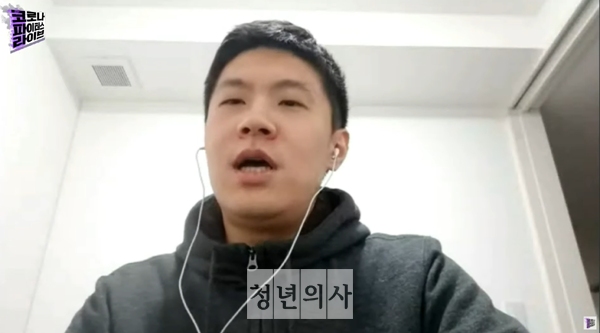The Japanese government’s push for the Tokyo Olympic Games at the initial stage of the new coronavirus outbreak took a heavy toll on the public health in Japan, observers said.
In late March, when Covid-19 was spreading worldwide quickly, Tokyo was still preoccupied with whether the Olympics would be held as scheduled or not. After the International Olympic Committee and Japan agreed to delay the Tokyo Olympics for one year, the number of Covid-19 cases started to surge in Japan, and the country suffered a crisis in the healthcare system.
Park Gwang-eop, a Korean anesthesiologist working in Tokyo, shared the Japanese situation amid the Covid-19 pandemic. As of Sunday, Japan had 10,807 confirmed cases, excluding 713 patients from Diamond Princess cruise ship and surpassing Korea’s 10,674. Japan’s death toll marked 251, also higher than Korea’s 236.

Appearing on a YouTube show, “Corona Fighters Live,” Friday by K-Healthlog, a channel operated by The Korean Doctors’ Weekly, Park said the Japanese government seemed to run about in confusion after the decision to postpone the Olympics.
After graduating from Soonchunhyang University College of Medicine and completing the public health doctor service, Park went to Japan in 2013 and received training in anesthesiology at Tokyo University for six years. He earned the medical license in 2011, two years before starting specialist training. After leaving a hospital where he worked as an anesthesiologist in March, he is working as a freelancer.
“Before the decision on March 24 to put off the Olympics, Japan paid more attention to the Olympics rather than Covid-19,” Park said. The Japanese officials did not tally the cases of infections within the Diamond Princess cruise ship in early February as local cases, which made the issue sound like a foreign story, he noted.
“People rarely talk about the cruise ship now.”
Japan failed to act consistently for 15 days after the decision to delay the Olympic Games, and the situation has quickly changed over the past week, Park said.
According to Park, 60 to 70 percent of Covid-19 patients in Japan have unclear transmission routes. Unlike in Korea, Japan does not disclose the movements of Covid-19 patients.
The rapid increase in confirmed cases overwhelmed medical institutions, and people are concerned that the healthcare system might collapse, Park said. Some Covid-19 patients are struggling to find a hospital to be admitted, traveling from one hospital to another in ambulances.
“Hospitals are refusing to admit Covid-19 patients because there are too many of them. There will be more cluster infections among hospitals. If other hospitals fail to accept patients, the medical system will collapse. But I don’t see any simulated predictions by the government,” Park said.
Unlike Korea, where tertiary hospitals treat most Covid-19 patients, Japan treats them in second-tier medical institutions. In Japan, university hospitals are smaller than those in Korea, and small hospitals take up a majority, Park said.
“Japan is facing a crisis because small hospitals cannot take Covid-19 patients. There are a limited number of hospitals that can do so, and the authorities are expanding them a little by a little,” he said.
He also worried about the shortage of medical resources to treat Covid-19 patients, such as intensive care units (ICU), ventilators, and extracorporeal membrane oxygenation (ECMO).
According to the Japanese Society of Intensive Care Medicine, Japan has 6,500 ICU beds, or five per 100,000 people. In Italy, the number stands at 10 ICU beds per 100,000.
Data by the Japanese Society of Respiratory Care Medicine and the Japan Association for Clinical Engineers showed that Japan had 22,000 ventilators and 1,400 ECMO machines as of February.
“Due to the shortage of doctors, nurses, and medical engineers, Japan can cover 1,400 ECMO devices up to 300 beds,” Park said. He heard that Japan was running a program called ECMO Net to use ECMO equipment in 800 beds simultaneously. Still, it was worrisome that the goal could be attainable at the right timing.
Japan did not seem to carry out Covid-19 tests quickly enough, he went on to say. Even if a Japanese person wants to be tested due to related symptoms, the testing is possible only through a regular doctor or a public health center. Then, the tests are run only at the state-designated research center. If a physician sends a specimen to a government research center, the result comes out in one day or two days.
However, the Japanese medical community is moving to simplify the process.
In Tokyo, where most Covid-19 cases were reported, a medical association was leading to prepare a simple procedure for PCR tests. The simple process does not go through a public health center. A regular doctor collects a specimen at a PCR center and sends it to a private testing institution, Park explained.
PCR centers will be installed in 47 places under the Tokyo Medical Association, and clinic owners are expected to take turns to work there, he added.
After Prime Minister Shinzo Abe declared a state of emergency initially for seven regions, including Tokyo, on April 7, streets went quiet. Abe expanded the emergency across the nation. However, critics in Japan said the declaration came too late.
Park said it was fortunate that the Japanese government was implementing response measures after the declaration of the emergency.
“It may be an unprecedented pandemic for Japan, too. To make it worse, the Olympics issue overlapped, and the government struggled. They are going this way and that way but working hard to set up new measures every day,” Park said. “I hope that everything normalizes as soon as possible. And I hope all healthcare workers do not lose a life or suffer side effects because of this pandemic.”

